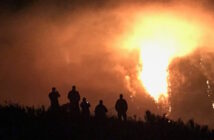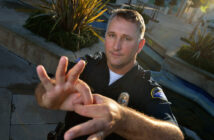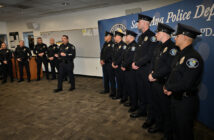Editor’s note: As part of our 10th anniversary, Behind the Badge is sharing stories from our archives on Tuesdays and Fridays. This story is from November 29, 2014.
It’s hard to explain the angst I’ve felt over the last few days as I’ve watched the aftermath of the Grand Jury findings in Ferguson. The wanton looting, angry protests and nonstop pundits on the 24-hour news channels got to me. For some reason, it feels even worse than the aftermath of the Rodney King verdicts when I was a police sergeant. I can honestly say it seems to preoccupy my thoughts.
As a police apologist of sorts, I try to convey to the everyday person what it’s like to wear a uniform and a badge. The harsh reality is that maybe that’s an impossible task.
As someone once pointed out to me, the general public will never understand what it’s like to be a police officer.
People can read every book and magazine about police officers. They can watch every episode of “COPS,” every police television show and movie. They can converse with, visit or even have family members who are police officers, and still they won’t know what it’s like.
You see, it’s difficult for the average person to put himself or herself in the position of being a police officer. The average person has never been in a knockdown, drag-out physical confrontation with someone bent on doing you harm. Believe me, it is scary, exhausting and something you do your best to avoid.
They’ve never walked down an alley at 2 a.m. and come across armed gang members in a darkened garage waiting for a rival gang.
They’ve never encountered a truly evil sociopathic person with no regard for human life — including, seemingly, his or her own. They’ve never chased a knucklehead who will lead police in a pursuit just because he has traffic warrants and ends up killing another motorist.
They’ve never arrested gang members who thought it would be fun to do a drive-by shooting against a rival gang and in the process kill an innocent child.
They’ve never wrestled a 12-year-old who’s pulled a gun on you as you’re breaking up an after-school tussle. They’ve never left a patrol briefing after watching a training video of an unarmed suspect pummeling a police officer to unconsciousness.
And most people have never attended the funeral of a police officer killed in the line of duty. They’ve never experienced the heartbreaking emotions of a family tearfully mourning the loss of a loved one — someone who made the choice to stand in harm’s way.
It’s within the context of these life experiences that police officers go out and serve every day. These are the experiences they will draw from when they are forced to make life-or-death, split-second decisions — decisions that will be second-guessed, investigated, criticized, litigated and most importantly, be on the front page for every Monday-morning quarterback to give his or her own two-cents worth on how the officer should have handled the situation.
The best I can hope for as I share what it’s like to be a police officer is simple empathy.
As an officer recently shared with me, “I just wish people would see we’re not superheroes. We’re just ordinary people trying to do a job under extraordinary circumstances.”
Joe is a retired Anaheim Police Department captain.
Editor’s note: The image at the top of this column comes from www.smitties911.co.za/
 Behind the Badge
Behind the Badge



